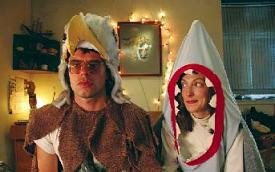 Don’t mistake “Eagle vs. Shark” for your average love story. This “romantic comedy turned on its head” by New Zealand director Taiko Waititi was one of the most talked-about premieres at Sundance. I heard at a previous screening someone called it “the best movie ever made.” When I arrived at the line early, the waiting list for stand-by admission was already sold out. At the opening shot, before anything really funny even happened, half the audience was already laughing out loud.
Don’t mistake “Eagle vs. Shark” for your average love story. This “romantic comedy turned on its head” by New Zealand director Taiko Waititi was one of the most talked-about premieres at Sundance. I heard at a previous screening someone called it “the best movie ever made.” When I arrived at the line early, the waiting list for stand-by admission was already sold out. At the opening shot, before anything really funny even happened, half the audience was already laughing out loud.
Think “Napoleon Dynamite” meets “Pride and Prejudice” with a dash of “Monty Python” and “Homestar Runner.” She is a shy but charming, guitar-playing underdog; he is a brooding, self-absorbed nerd at the top of the video gamers’ social ladder. Imagine Mr. Darcy with taped-up glasses, martial arts T-shirts, and an old-school game console. But the resemblance to Jane Austen’s famous couple ends there.
Instead of fluently witty banter, their interactions are rather awkward. The premise of two geeks clumsily falling in love was the film’s selling point, but what makes “Eagle vs. Shark” great are the layers within it. What Lily and Jarrod are unable to articulate in words arrives via subtext and symbolism. They express themselves through their favorite animals–Jarrod is the eagle and Lily is the shark–reflecting their different personalities (perhaps a reference to “air” and “water” in ancient temperament theories).
Jarrod (Jemaine Clement) has his head in the clouds and an ax to grind. He is so hung up on a grudge with the old classmate who used to beat him up that he forgets what he has in front of him. Lily (Loren Horsley) is not the aggressive extroverted personality one would associate with a shark, but in her own quiet way she is determined to catch Jarrod, and her piercing eyes express much more than she is able to say.
At the heart of “Eagle vs. Shark” resides the desire for love and acceptance. Jarrod has a tense relationship with his family and exaggerates Lily’s accomplishments in an unnecessary effort to get them to like her. He makes himself feel good about his catch. He also feels like his past defines him, and he gets preoccupied (hilariously) preparing for a “duel” to defend his “honor.” Lily also wants acceptance. In one image, she feels the weight of staggering rejection. Later, the same image results in sudden popularity.
A stop-motion subplot carries the symbolism further. Wistful colors and beautiful shots of New Zealand are mixed with abstract imagery and computer technology of questionable age. As in the breakout Sundance hit, “Napoleon Dynamite,” it is hard to tell when “Eagle vs. Shark” takes place… but you’re laughing so much you don’t care.
“Eagle vs. Shark” is unlike any other romantic comedy I’ve seen. It already scored a distribution deal with Miramax and is slated for a summer release. I can see the Hot Topic merchandise already. But don’t mistake this for mindless entertainment. While “Eagle vs. Shark” may not inspire late-night coffee shop conversations on social justice, it still hits close to home regarding human nature. This New Zealand comedy inspires laughter–and even healing.
— Posted by Rachelle Klemme
Rachelle Klemme is a film major at Biola University (www.mcom.biola.edu) in La Mirada, California.


